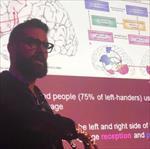
Event Date:
Thursday, January 13th, 2022 – 12:00 PM to 1:00 PM
Speaker:
Leighton Hinkley Ph.D.
Host:
Santani Teng
Abstract
Over the past several decades, magnetoencephalography (MEG) has emerged as an efficient technique to study brain function non-invasively with a high temporal resolution. Advancements in algorithms used to reconstruct this activity in “source space” (MEG imaging; MEG-I) allow neuroimagers to more accurately localize whereas on the cortical mantle changes in brain activity are coming from. Here, we provide several demonstrations where this technique can be applied to studies of visual cortical processing. Recent developments in our lab have pushed the boundaries of what can be achieved with these types of datasets, from accurate localization of koniocortical evoked fields to visuomotor integration and studying higher-order cognitive processing in neurological and psychiatric disorders. These types of approaches provide a strong non-invasive opportunity to understand how these cortices operate at a fine level in space and time for basic studies of visual neuroscience, understanding the neurobiological basis of visual disorders, and tracking brain plasticity through rehabilitation. https://brain.ucsf.edu/leighton-hinkley-phd
